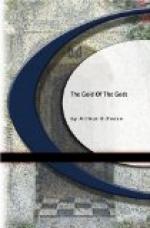“Most peculiar, Kennedy,” reiterated Dr. Leslie, pointing to the breast. “You see that wound? I can’t quite determine whether that was the real cause of death or not. Of course, it’s a bad wound, it’s true. But there seems to be something else here, too. Look at the pupils of his eyes, how contracted they are. The lungs seem congested, too. He has all the marks of having been asphyxiated. Yet there are no indications on his throat of violence such as would be necessary if that were the case. There could have been no such thing as illuminating gas, nor have we found any trace of any receptacles which might have held poison. I can’t seem to make it out.”
Kennedy bent over the body and looked at it attentively for several minutes, while we stood back of him, scarcely uttering a word in the presence of this terrible thing.
Deftly Kennedy managed to extract a few drops of blood from about the wound and transfer them to a very small test-tube which he carried in a little emergency pocket-case in order to preserve material for future study.
“You say the dagger was triangular, Norton?” he asked finally, without looking up from his minute examination.
“Yes, with another blade that shot out automatically when you knew the secret of pressing the hilt in a certain way. The outside triangular blade separated into three to allow an inner blade to shoot out.”
Kennedy had risen and, as Norton described the Inca dagger, looked from one to the other of us keenly.
“That blade was poisoned,” he concluded quietly. “We have a clue to your missing dagger. Mendoza was murdered by it!”
II
THE SOLDIER OF FORTUNE
“I should like to have another talk with Senorita Inez,” remarked Kennedy, a few minutes later, as with Dr. Leslie and Professor Norton we turned into the living room and closed the door to the den.
While Norton volunteered to send one of the servants in to see whether the young lady was able to stand the strain of another interview, Dr. Leslie received a hurry call to another case.
“You’ll let me know, Kennedy, if you discover anything?” he asked, shaking hands with us. “I shall keep you informed, also, from my end. That poison completely baffles me—so far. You know, we might as well work together.”
“Assuredly,” agreed Craig, as the coroner left. “That,” he added to me, as the door closed, “was one word for me and two for himself. I can do the work; he wants to save his official face. He never will know what that poison was—until I tell him.”
Inez had by this time so far recovered her composure that she was able to meet us again in the living room.
“I’m very sorry to have to trouble you again,” apologized Kennedy, “but if I am to get anywhere in this case I must have the facts.”
She looked at him, half-puzzled, and, I fancied, half-frightened, too. “Anything I can tell you—of course, ask me,” she said.




